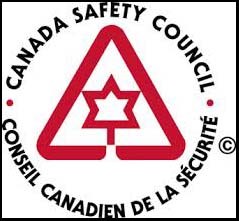The Canada Safety Council is reminding Canadians that it’s not just alcohol that impairs.
Driving is such a daily activity, we can easily forget that it’s a complex task requiring skill, concentration and alertness. In the rush from Point A to Point B, we may not always be mindful of the responsibility involved in piloting two tons of moving steel, glass and plastic. Given the potentially deadly consequences of doing a poor job, doesn’t it make sense to bring your best self to the task?
By now, we all know that drinking and driving is a bad idea. But what about drugs and driving?
Let’s focus on the effects of weed (marijuana or cannabis) because it’s one of the most common illicit drugs found in drivers after a deadly crash.
You might think:
“Smoking weed helps me concentrate. Plus, I drive slower. Doesn’t that make me a better driver?”
The truth is any safety benefit you might get from driving slower is more than outweighed by the additional risk of slower reaction times, foggier thinking, and altered time perception you experience when high on weed.
“I just had a little to drink and a couple puffs. I feel fine to drive.”
The reality is alcohol has a “multiplicative” effect on other drugs. That means having a drink if you’ve also had some weed results in far greater impairments than taking either alone. So even if you haven’t consumed enough liquor to blow over at a Checkstop, if you’ve got weed in the system, your driving will be as bad as someone who has had far more to drink.
Drivers who are high on marijuana tend to compensate by driving more slowly and leaving more follow distance. This behaviour disappears when the driver has a drink, because alcohol makes them feel less impaired even though they are more impaired.(American Journal on Addictions, 2009)
If you have taken weed and alcohol, just don’t drive.
“I really don’t feel that toking and driving is as bad as drinking and driving.”
Eating a Sloppy Joe while driving might be safer than texting and driving, but ultimately, they’re both dangerous. The same goes with drug-impaired driving and drunk driving. They’re both risky behaviours that significantly increase the chances of the story ending badly.
Drug Impaired Driving and the Law
It’s illegal to operate a motorized vehicle if your ability to drive is impaired by alcohol or drugs, whether illegal or legal drugs, prescription or over-the-counter. That vehicle could be a car, truck, motorcycle, ATV, snowmobile or boat, and it doesn’t even have to be moving – you could be charged under the Criminal Code if you’re the one with the keys behind the wheel.
If a police officer suspects you of having taken drugs, or a combination of alcohol and drugs, you could be required to undergo testing to determine if you are impaired. Failure to comply with the request for testing results in charges similar to alcohol-impaired driving.
In addition to criminal charges, drug-impaired drivers also face penalties that vary by province, and the type of licence the driver holds. These penalties include immediate roadside suspensions, impounding of the vehicle, loss of your licence and steep fines.
Don’t drive impaired
Plan ahead. Have a designated driver, arrange a ride in advance, or call a cab.
Socialize responsibly.
Before getting behind the wheel, ask yourself: “Am I safe to drive?” It’s not just alcohol that can impair your ability to drive.
Friends don’t let friends drive impaired - have the conversation that could save a life.



